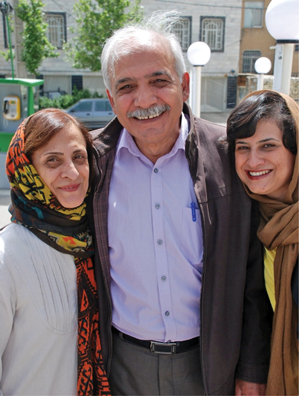Source: www.technologyreview.com
On April 30, 2015, I was standing behind the very tall and heavy door of Rajaee-Shahr prison in the suburbs of Tehran, anxiously waiting for a moment I’d been imagining for four years. At last, the door opened and I could see the waiting crowd that included my family, friends, and former students. The first thing I did was hug my wife. We were both crying.
In 2011, my career had taken an unexpected and unusual turn: I was imprisoned for the crime of teaching physics at an “unofficial” university called the Baha’i Institute for Higher Education (BIHE).
Iran’s Baha’i community created BIHE in the 1980s after our youth were banned from Iranian universities. I began volunteering there in 1989 after serving three years in prison for simply being an active Baha’i. At BIHE, I taught physics and electronics and, as a member of BIHE’s e-learning committee, was a liaison with MIT’s OpenCourseWare Consortium. When I was arrested in 2011, I was on the engineering faculty at BIHE on top of my day job at an engineering company.
After six months in solitary confinement, I joined 70 to 80 fellow prisoners of conscience (many of us Baha’is); I shared a two-by-four-meter room with five others. I spent most of my time meditating, praying, and reading any available books. I wrote letters to friends and family, talked to fellow prisoners, and taught English.
Weekly visits with my wife and daughter (and sometimes my sister) provided a connection to the outside world. They brought news of calls, e-mails, and visits from my friends and colleagues. Once my daughter brought me a copy of MIT Technology Review, which I read line by line and page by page, including all the advertisements! But the authorities did not allow me to receive the next issue, because it was in English and no one there could verify its contents.
Now that some months have passed since the day of my freedom, I am back to almost normal life and work at the same engineering company. But my heart is still with my fellow prisoners at Rajaee-Shahr.
The experience of being a prisoner showed me there is a lot in our daily lives that we take for granted. After being in solitary for months, I was given access to a 12-inch TV. Looking at the colors on the screen was very exciting—blue, red, green, pink. I hadn’t appreciated the importance of color until I went without it. And now whenever I walk with my wife, I am very conscious of how dear these moments are, and I try to enjoy every one. My wife suffered much more than I did. I have committed myself to comforting her for the rest of my life.
My gratitude for many things also increased: the love of my wife and daughter, the respect of my former students and friends. Now many of my students have graduated and are responsible people with respectable careers as engineers and managers. Many bring their children to visit me. I am happy that I have had a tiny share in their success, and when I look at them I sometimes think the whole prison term was worthwhile.
In prison, I had a chance to read Nelson Mandela’s inspiring book Long Walk to Freedom several times. In it, he writes that education is the great engine of personal development. Through education, the daughter of a peasant can become a doctor, the son of a mine worker can become the head of the mine, a child of farm workers can become the president of a great nation. This was exactly what I wanted to do at BIHE for the young Baha’is.
I am sharing my story with the MIT community because MIT means a lot to me and I follow its news closely. MIT has been involved with BIHE since the beginning, with several MIT alumni, staff members, and academics lending their support. In September 1999, Chuck Vest joined the presidents of several other U.S. universities to appeal to the Iranian government to restore education to Baha’i youth in Iran.
My incarceration taught me that we, the privileged and educated population, have a great responsibility to the world. Humanity is suffering from prejudice, poverty, and lack of democracy. As engineers and scientists, we can do much to address these issues.
Mahmoud Badavam, SM ’78, who works for an engineering consulting company in Tehran, has not resumed teaching physics at BIHE. But he hopes that it will one day be legal to do so

December 23, 2015 5:40 am
Thank you for this happy story – that the dear professor is out of prison and is grateful for the perspective that his hardship gave. How sweet that he sees some fruits of his labour. I am thrilled to know that Massachusetts Institute of Technology (MIT) has been supportive of BIHE since early days. That is marvelous. May the gracious Lord abundantly bless Professor Badavam and his family.